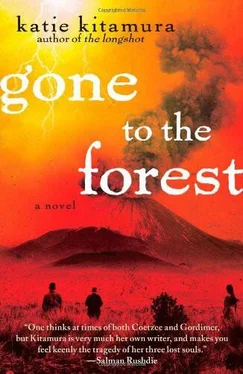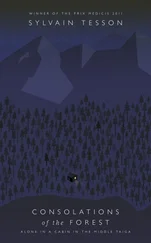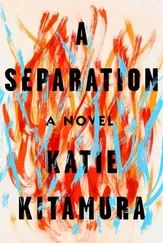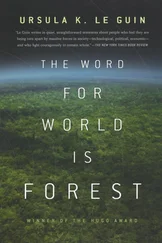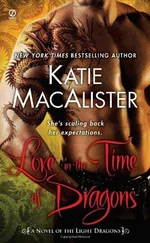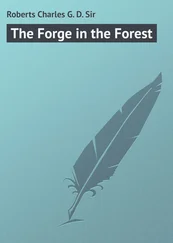“Did she go?”
He jolts back. The girl, who has been gone a week if not longer. The old man leers at him conspiratorially. As if to say, You and I both know what I am talking about. And Tom does in fact know. But he does not know what the old man means by the leer and the wink.
“Do you mean Carine?”
“ Tccch. ”
That’s all his father says. His fingers back to patting the cover in place. His eyes back to roaming the ceiling. He is smiling. Wistfully, like he is listening to nostalgic music in his head. Tom has never seen his father like this. The old man does not smile. Not like this and not wistfully. Tom shakes his head.
“She is gone.”
He hopes the fact of the girl’s departure will bring his father back. But his father is a million miles away. He waves his hands in the air like he is conducting an orchestra. Then he folds his hands together and rests them on the quilt. He closes his eyes. He is still smirking.
Tom realizes that if he had a different relationship with his father, if he loved him in a way he understood, in a way that he knew to be normal, if the numbness had not overtaken his body — then he would have found this tragic. He would have been weeping into his cup of tea the way Celeste weeps into her pot of soup. But he is not. He does not have access to those tears.
Tom stands up. The old man is asleep and there is no point in his staying. He exits the room and returns to the kitchen. Left alone, the old man opens his eyes and goes back to crawling the walls with his vision.
Tom sits down at the kitchen table. His father’s eyes on the bottle. The gleam against the cloudy pupils. His thoughts return to the problem of the medicine. The old man is lusting after the pills the way he once lusted after women. And he is a man whose needs must be satisfied. He will need more pills. He will need them very soon. Tom has a headache. He tries to think through the throbbing. He thinks the nearest doctor is in Herbertville, sixty kilometers away.
He thinks but is not sure. He has never been to Herbertville. He believes it is a day’s journey. He has no idea how to organize such a journey. On a horse? In the car? Alone or with help? (Not alone. He will not do such a thing alone.) He tries to imagine himself walking the streets of Herbertville. He tries to imagine how he will explain it to the doctor. Pain management, he thinks they call it. After a certain point you have to concentrate on pain management.
He will need money for the doctor. And he will need a horse. The car is useless, the car is barely running, and then there is the fact that he does not know how to drive. Tom does not know if going to Herbertville is a good idea but he understands that he is a man without choice. People shoot cattle in the head when they are too far gone for saving. The old man is too far gone for saving but shooting him in the head is not an option as far as Tom can tell.
No — the gun being out of the picture, Tom will go find a doctor, who will give him more pills and tell him about the pain management. He will need to get Jose to travel with him. Jose is a good horseman. He has traveled the roads and knows the area well. And Jose is good with people. Tom is not good with people. He does not do well with strangers, not even with people he knows. But Jose — yes, Jose is different.
With this in mind Tom goes to find him. He walks the road leading to the stables. This road is generally deserted and runs clear and unimpeded across the land. He can therefore see the men in the distance. He counts four or possibly five. They come down the road, down from the farm, riding bicycles. They have tied plastic bags to the backs of the seats and there are plastic bags hanging and swinging from the handlebars.
Mystified, Tom stops and watches the men approach. His men, they are his natives. The sound of wheels whirring fast as the bags rock and jolt and are covered in dust. The men wear bandannas across their faces and dark glasses to protect their eyes. They have large rucksacks strapped to their backs and humpbacked they roll forward, they occupy the road, gaining speed as they move.
Two-wheeled as they are, they catapult toward him. Tom leaps to the side of the road. They come within a single foot of him but swarm past without stopping — they act as if they do not see him, their eyes invisible behind the sunglasses and road goggles. They pedal furiously and the dust rises ten feet into the air as they go.
Within seconds they are gone. Tom stares after them as they disappear down the road. They move past the gate and exit the farm. He stares at the empty road. It is silent. The stables are quiet. He listens to insect sounds and watches the dust cloud settle to the ground. He stares at the earth and is baffled.
He turns and then sees another group of men. A sea of them coming down the road on bicycles and motorcycles, these men carrying their wives and children. The men ignore him but some of the women and children, some nod or wave as they pass. None of them slow. None stop to explain. They churn more dust instead, they toss the dirt back up into the air.
They are fleeing. The last of the farmhands are leaving. They are abandoning the estate. This time Tom runs after them. He shouts into their cloud of dust.
“Where are you going? What are you doing?”
Still they do not stop and so he runs faster, waving his arms.
“What has happened? Why are you leaving?”
He is talking to a mountain of dust. They are meters away, they are half the distance to the gate, they have disappeared down the road. He stares after them. He turns and looks back at the farm. It is silent again. He watches as the road dust settles. He looks for the men, he tries to spot them in the distance, but they have disappeared and the landscape is still.
He hears a whirring sound behind him. A young boy comes cycling down the road after the pack. Tom races into the road and flings his arms out.
“Stop! Stop!”
The boy swerves and tumbles off his bicycle. He scrambles to his feet, hopping. There is a cut across his knee. Tom looks at the boy’s face. He is not certain that he has seen him before. He does not know his name.
“Where are you going?”
The boy shakes his head and rights the bicycle.
“Tell me where you are going!”
“It is not safe here.”
Tom laughs.
“What are you talking about?”
“The rebellion is coming. The men who go to the forest — they are coming.”
Tom grabs the boy by the shoulders.
“You are just a little boy. You do not know what you are talking about.”
The boy shakes himself free.
“Mister, I know what I am talking about.”
He gets back on the bicycle.
“I have to go. They will not wait for me.”
“Who will not wait? Where are you going?”
The boy shakes his head and calls out as he pedals away.
“I know what I am talking about! You will see!”
Tom watches him cycle down the road and then disappear. The farm is now completely silent. He whirls around and runs to the house. He finds Jose by the stables. He is smoking a cigarette. Tom stops in front of him, gasping for breath.
“What is it? Why have they gone?”
Jose looks at him. In the silence, Tom becomes increasingly aware of Jose’s contempt. Which for the first time he displays to Tom without mitigation. He takes his time before replying.
“They have gone.”
“Yes, but where?”
Tom is still trying to recover his breath. Jose stubs out his cigarette on the ground and then carefully retrieves the butt. He holds it in his fingers.
“They are afraid.”
“I don’t understand.”
“I know.”
He looks at Tom.
“I hope they will not come so far as the valley. But you should be prepared.”
Читать дальше
